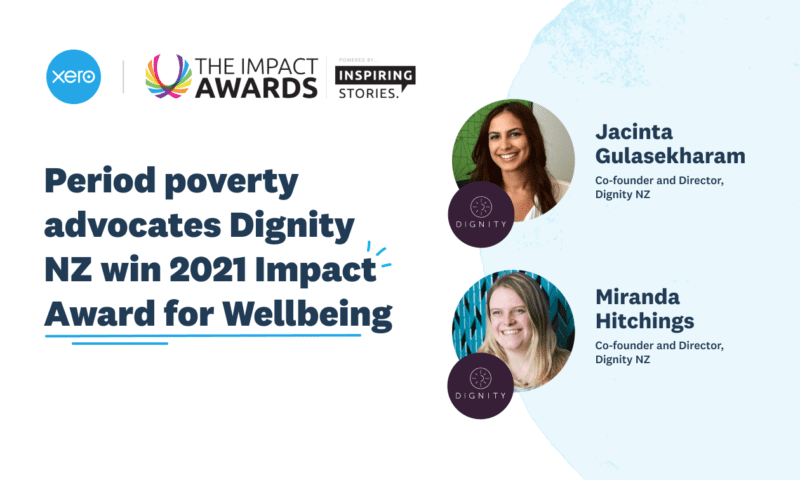Xero to acquire Melio: A payments game-changer for small businesses across the US




New Zealand’s largest social innovation summit Festival for the Future 2021 was recently held at Wellington’s TSB arena alongside its inspiring awards evening. Celebrating remarkable young New Zealanders making a difference for the future, the Impact Awards had over $30,000 in prizes awarded across six major categories – climate, enterprise, inclusion, wellbeing, local and global impact.
Winners of the Impact Award for Wellbeing, proudly sponsored by Xero, were Dignity NZ. A women’s wellness initiative with a mission to champion period equity in Aotearoa, Dignity has been shaking things up for period norms since 2016.
We sat down with Founders Miranda Hitchings and Jacinta Gulasekharam to find out what sparked the creation of Dignity, their thoughts on the Government’s recent period product implementation across schools, and what’s next for the unstoppable pair.
Dignity came from a series of ‘aha’ moments for us. As students, we were both frustrated with the cost and shame that came with having a period. We felt there was an undue burden on us to absorb all the expense whilst also silently managing the admin and pain that comes with it.
Our initial idea was an app that delivered period products to consumers. However, after undertaking customer interviews, we found that there was also a great sense of unfairness that products weren’t freely available when they needed them, especially at work. So, we pivoted towards a workplace ‘period’ wellbeing initiative. At the same time, we saw on the news that students were missing out on school due to lack of access to products, this is when we decided to create our ‘Buy-one, Give-one’ impact model too.
Dignity provides free period products through two Impact Initiatives: ‘Buy-one, Give-one’ partnerships for business, and gifting initiatives for the benefit of Kiwi workplaces, youth, and community groups.
Our Impact Partners (like Xero) are workplaces that subscribe to the Dignity initiative to provide free, organic period products in our display boxes in the bathrooms. We then give away the equivalent number of boxes purchased to our ‘Give’ partners who have requested period products for the thousands of students and people across Aotearoa they support who don’t have access to period products and experience period poverty.
Our gifting initiative launched during 2020 to provide an online platform for individuals and businesses to support our Give One, Two, Three packages to give one Oi Cup, two boxes of period products or three pairs of AWWA underwear.
Dignity has helped supply nearly 200 schools and community organisations with free access to period products and gifted 36,927 boxes of period products, 703 Oi menstrual cups and 1,704 pairs of AWWA period proof underwear.
Through our research with our ‘Give’ partners (schools and community groups), we have identified some really lovely outcomes of providing period products to those without access. Not only does it reduce the financial implications of having a period and increase attendance in school and society, but the intervention has also found to increase the wellbeing of users.
Our latest Quarter 2, 2021 School Survey found that:
The survey also found that “students are grateful, happy, and more positive about themselves. They have a better sense of confidence that they can discreetly have access to products when they need to. They feel more secure knowing that we have the support they need during times of their ikura and are able to participate more in activities with more confidence and less embarrassment”.
Dignity has been overwhelmed with demand for period products since COVID-19. While the economy has seemingly ‘bounced back’ and unemployment is at a record low, this sadly does not reflect a significant reduction in poverty, and subsequently period poverty is still an issue. COVID-19 and the subsequent economic changes (increased housing and rent prices, rising inflation, and so on) have increased the cost of living. The number of community groups requesting period products from us has more than doubled and we now support 117 community organisations across Aotearoa.
Providing period products is a fantastic first step because it addresses the cost associated with period poverty. However, there are other factors that contribute to the complexity of the issue. These include awareness and education, shame, the environmental impact, and ensuring toilet facilities within schools adequately support good menstrual hygiene.
It is critical that comprehensive sexuality education is taught alongside the roll out which addresses a range of topics associated with periods and gynaecological health, as well as taking steps to reduce the social stigma around the issue. Additionally, low carbon and reusable options should be considered as part of the roll out in the future and bathroom facilities should be equipped so students can use menstrual cups and discreetly wash them.
As period poverty is a subset of poverty the issue does not just affect school students, but everyone impacted by poverty. While this is an amazing stepping stone by our Government, the systemic issues that contribute to poverty in Aotearoa must be addressed. There is no simple solution to address the causes and consequences of poverty – solutions need to address a range of factors. 100% of responders to our Q2 community survey indicated cost was the main barrier to accessing period products. So until people have adequate income to meet their needs, they will continue to be disadvantaged.
The team have worked so hard through COVID-19 to get out the other side as a stronger, more resilient, collective social enterprise in 2021. It is a huge source of pride and accomplishment for all of us to be acknowledged for getting the Government policy across the line, growing our business by 20 Impact Partners this year and sending over 3,000 sustainable period products to Impact Partners across the country. Having this public recognition of our achievements is a bonus and helps with awareness of the Dignity initiative for workplaces in Aotearoa alongside our mission to deliver period equity.
With the increased awareness of period poverty, we have been inundated with requests for period products. This means our wait list is months long and we have demand for more products than we can fulfill. The prize money is helping us to fulfill approximately 800 boxes of organic pads and tampons out of the total 4,000 boxes requested that we aren’t able to fulfill right now. This will provide free period products to 50 of our school and community group partners supporting 15,000 students and people experiencing period poverty between them.
We are aiming to provide access to a total of 50,000 sustainable period products by our 5th birthday this coming November. We want to continue to use our impact reporting to create change and advocate for period equity in the areas of the community and period pain.
Longer term, we want to normalise period products in the workplace and be a prolific wellness initiative across all Aotearoa workplaces. With our range of products from organic pads, tampons, reusable period cups and underwear, we want to encourage the use of sustainable products for our body and planet.
Share this article
[addtoany]Find out why 4.2 million subscribers locally and across the world trust Xero with their numbers.
Try Xero for freeYou're on our United Kingdom website. Change your region to see information and pricing for another location.